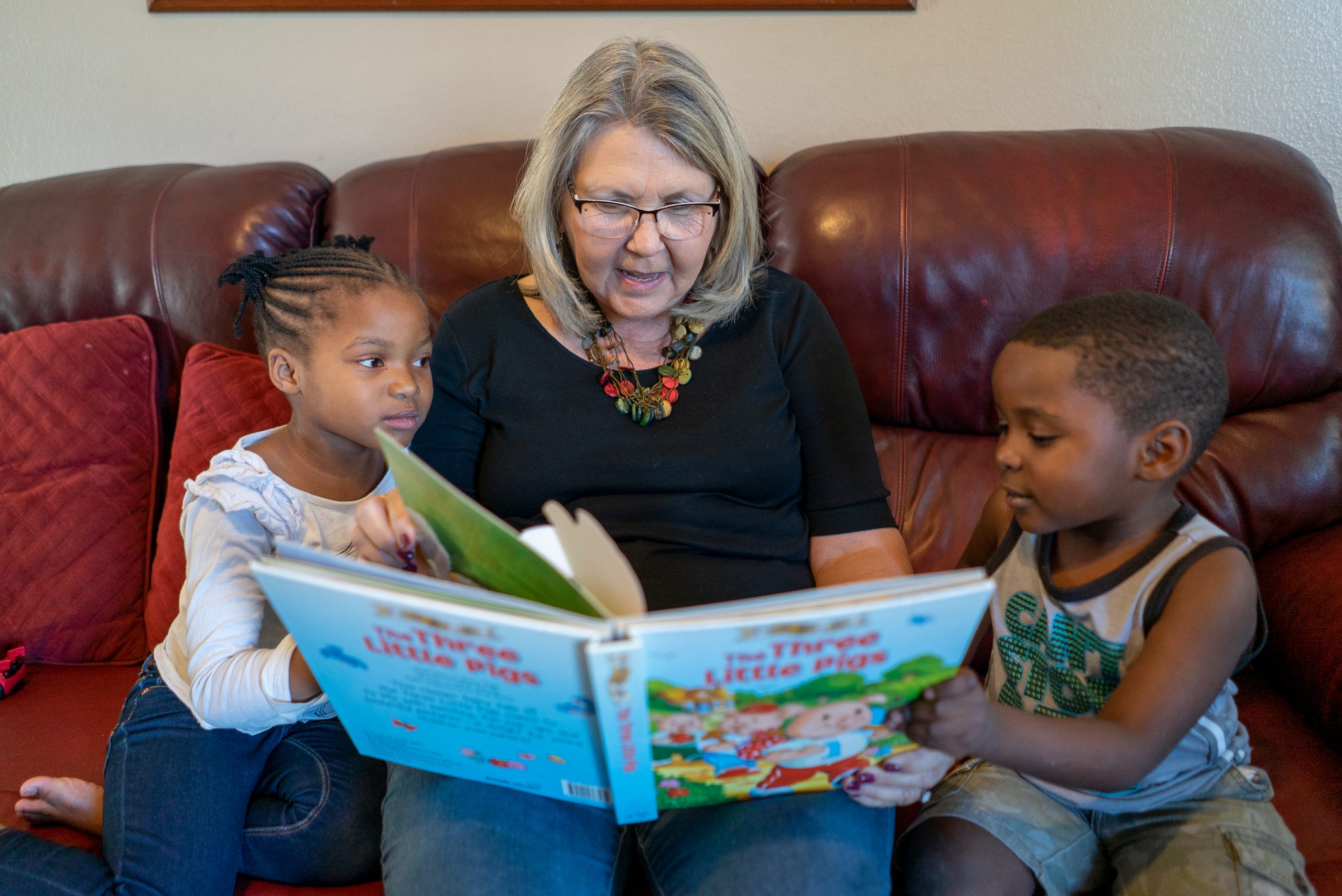
Resources for Sponsors and Community Stakeholders
Newcomers resettling to the United States receive Cultural Orientation (CO) to learn about life in the United States. CO is a collaborative process that starts overseas at Resettlement Support Centers and continues in the United States with domestic CO providers. Domestically, local Resettlement Agencies and community members provide resettlement services to newcomers. This page includes teaching materials for sponsors and community stakeholders to use for CO delivery.
A Community-Based Approach to Cultural Orientation
Community members play an important role in delivering key Cultural Orientation (CO) messages. When community members contribute to the delivery of CO, we call it a community-based approach to CO. How community members support CO delivery depends on how often they provide CO. CORE divides CO providers into two groups: regular CO providers and one-time CO providers. Regular CO providers support the delivery of CO to many newcomers. One-time CO providers support the delivery of CO to one newcomer or one newcomer family; they teach CO only once. Catering specifically to the needs of sponsors, this page provides grab-and-go teaching materials for one-time CO providers.
Photo Credit: Andrew Oberstadt /IRC
Defining Sponsors andCommunity Stakeholders
IMAGE CAROUSEL
What is the difference between a sponsor and community stakeholder?
Slide Content
What is the difference between a sponsor and community stakeholder?
The term sponsor refers to everyday Americans who come together to provide early resettlement services and financial support to newcomers as they resettle into their new communities. They include cosponsors, remote placement community partners, private sponsors, and sponsor circles. These groups may sponsor newcomers in collaboration with Resettlement Agencies or privately through programs such as Sponsor Circles or the Welcome Corps.
The term community stakeholder refers to organizations or individuals outside of the local Resettlement Agency that support newcomers, including but not limited to educators, law enforcement, state public assistance workers, and healthcare professionals.
Photo Credit: E Fichtner/IRC
What are the Sponsor Circle and the Welcome Corps Programs?
The Sponsor Circle Program is an emergency response launched to support beneficiaries of humanitarian parole programs. Humanitarian parole is a complementary pathway to the United States Refugee Admissions Program (USRAP). Unlike USRAP beneficiaries, the Sponsor Circle Program does not include a pathway to permanent residency or citizenship. Learn more about the Sponsor Circle Program, here.
The Welcome Corps Program allows private sponsors to support the resettlement of refugees who:
- Have already been referred and approved for resettlement through the traditional USRAP resettlement process or;
- Are personally identified and referred for resettlement by the sponsor group.
While Welcome Corps sponsor groups provide similar support to sponsor circles, beneficiaries have refugee status, which can lead to permanent residency and citizenship. All refugees, despite the referral process, go through security vetting, health screenings, and background checks. Learn more about the Welcome Corps Program, here.
Photo Credit: Andrew Oberstadt /IRC
What is the role of the Resettlement Agency?
Sponsorship has long existed in the United States. However, since the Refugee Act of 1980, Resettlement Agencies have played a formal and critical role with the delivery of early resettlement services. As such, many of CORE’s resources reference the Resettlement Agency (or case manager) as the primary service provider.
When not sponsoring newcomers in collaboration with Resettlement Agencies, sponsors are responsible to provide all early resettlement services. However, the Resettlement Agency may provide integration services to eligible newcomers. To avoid confusion, clarify your role and the role of the Resettlement Agency with newcomers.
Photo Credit: Shuran Huang/IRC
Should volunteers use the resources on this page?
Volunteers are community members that support Resettlement Agencies with the delivery of early resettlement services. Unlike some sponsors, many volunteers support Cultural Orientation (CO) delivery for newcomers on an ongoing basis. As regular CO providers, instead of accessing the resources on this page, these types of volunteers should access all of CORE’s provider-facing teaching materials, including the Road Ahead – CORE’s foundational domestic CO curriculum.
Photo Credit: Andrew Oberstadt/IRC
Resources for Sponsors
Once you complete the mandatory trainings required to be certified and serve as a sponsor, you should prepare to welcome newcomers by reviewing CORE’s resources created specifically for sponsors.
Before accessing any of CORE’s resources for CO delivery, sponsors should take CORE’s 35-minute course, A Community-Based Approach to CO. This course teaches sponsors basics about CO, helps you decide which resources to use for CO delivery, and shows you how to navigate the CO toolkit and Settle In digital properties. Register for the course now!
Coming Soon: In 2025, using the content from CORE’s handout, A Two Directional Approach to CO, CORE will create part two of our new online learning pathway for sponsors. To stay up-to-date on CORE learning opportunities, new resources, and changes to Settle In digital properties, subscribe to CORE’s newsletter.
The CO Toolkit is a grab-and-go resource that teaches CO providers to incorporate key CO messages into the early resettlement services they are already providing, such as enrolling children in school or applying for health insurance. This resource does not require the editing or printing of additional activity materials.
Sponsors can experience cognitive overload when preparing to welcome newcomers. To avoid information fatigue, do not read this toolkit from start to finish. Instead, before providing a service, review and print the relevant activity instructions from the toolkit to provide CO on the go!
CORE’s newcomer-facing Settle In resources are integrated throughout the CO toolkit. Newcomers can access CORE’s multilingual Settle In resources through a website, app, and social media. Explore Settle In resources before introducing them to newcomers. This will help you answer their questions. Watch this video to learn more! Then, reference CORE’s step-by-step guides to learn more about playing videos from the Settle In website and completing lessons on the Settle In app.
The handout, a Two Directional Approach to CO, teaches that CO is two-directional. Community members have a responsibility to teach newcomers about life in the United States and to learn about the culture and values of their new neighbors. This resource offers quick and easy-to-use ideas that prepare sponsors to actively take steps to learn about a newcomer’s values and encourage them to honor and preserve those values.
The Road Ahead is a foundational domestic CO curriculum. This curriculum was not created specifically for sponsors. CO providers using this resource must dedicate time for preparation (10 hours) and facilitation (10-12 hours). Curriculum materials include translated slide decks, facilitation notes, and activity materials.

Photo Credit: Andrew Oberstadt /IRC

Photo Credit: Andrew Oberstadt/ IRC

Tips for Co-Sponsors
Co-sponsors collaborate with a local resettlement agency to sponsor newcomers. Co-sponsors are not responsible for providing all early resettlement services. Co-sponsors will provide some early resettlement services and the local Resettlement Agency will provide some services. When responsible for providing Cultural Orientation (CO), co-sponsors generally do not facilitate a domestic CO curriculum more than once. As one-time CO providers, cosponsors should follow these onboarding tips to ensure successful delivery of CO:
The CO Objectives and Indicators (CO O&Is) outline the topics and content covered in CO and ensure consistent messaging from overseas to domestic CO. The Overseas CO O&Is provide foundational information, and the Domestic CO O&Is build on that information. Review the CO O&Is to learn more about what information is covered in CO. Then, consider attending CO at the local Resettlement Agency (RA) to review the available teaching materials. With the local RA, determine who will deliver CO and the CO assessment.
If the CO assessment indicates that newcomers did not demonstrate their knowledge of the underlying concepts in CO, then create a plan to address the newcomers’ needs. With the local Resettlement Agency, determine who will ensure newcomers learn the essential information and skills taught in domestic CO. Sponsors may use the relevant section of the Road Ahead- CORE’s foundational domestic CO curriculum, or CORE’s activity bank to review specific CO topics with newcomers.
Use the CO toolkit to integrate key CO messages into the early resettlement services that the co-sponsor team is responsible for. Use the CO activities checklist to track which activities group members facilitate.
Resources for Community Stakeholders
The community stakeholder fact sheets support educators, law enforcement, state public assistance staff, and healthcare professionals in incorporating key Cultural Orientation (CO) messages in their service provision. The fact sheets include tips for effective service delivery, example CO messages relevant to the community stakeholder, and an example activity showing how community stakeholders can incorporate these key CO messages into interactions with newcomers. Since the resources contain general information for each service provider, community stakeholders may want to add community-specific information and resources.
K-12 Educators
Law Enforcement
State Public Assistance Workers
Additional Resources
- Community Sponsorship Hub: Information about all forms of sponsorship
- Refugee Welcome Collective: Training for sponsors
- Sponsor Circles: Sponsor Circle Program
- Switchboard: Welcome Corps Support Line
- Welcome.US: Sponsorship portal
- Welcome Corps: Information on private sponsorship
- CORE: Learn more about refugee populations resettling in the United States
- Refugee Processing Center: Directory of local Resettlement Agencies
- Switchboard: Who are the Afghan Newcomers?
- Switchboard: Explore more resources for serving Afghan evacuees
- U.S. Citizenship and Immigration Services: Uniting for Ukraine
- Switchboard: Uniting for Ukraine Support Line
- International Rescue Committee (IRC): Introduction to Case Management for Refugee Service Providers
- Switchboard: Tips for Getting Started with Safeguarding and Protection
- Switchboard: Guide on Trauma-Informed Care
- Switchboard: Guide on Cultural Competence in Refugee Service Settings
- CORE: Working with Interpreters
- Switchboard: Introduction to Working with Interpreters
- Switchboard: Reference Guide on Employment Authorization Documents
- Switchboard: A Roadmap for Hiring Afghan Newcomers
- Switchboard: Guide on Housing and Urban Development (HUD) Resources
- Switchboard: Tip Sheet on USDA Rural Housing Service Program
- Refugee Housing Solutions Tenant Toolkit: Arabic, Burmese, Congolese, Swahili, Dari, English, Kinyarwanda, Pashto, Russian, Spanish, and Ukrainian.
- Bridging Refugee Youth & Children’s Services (BRYCS): Information hub for empowering immigrant children and their families
- Switchboard: Toolkit on Supporting Afghan Students in Schools & Youth Programs in the United States


